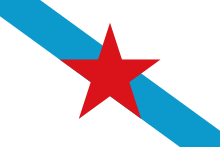

This article includes a list of general references, but it lacks sufficient corresponding inline citations. Please help to improve this article by introducing more precise citations. (February 2012) (Learn how and when to remove this message)
|




Galician nationalism is a form of nationalism found mostly in Galicia, which asserts that Galicians are a nation and that promotes the cultural unity of Galicians. The political movement referred to as modern Galician nationalism was born at the beginning of the twentieth century from the idea of Galicianism.
Historians, geographers and ethnologists recognize the existence of a Galician ethnic group, forming a singular unit in a specific territory.[1][failed verification] However, this is a wide conceptualization that in political terms allows many possible variants. Inside Galician nationalism two main ideological currents can be found:
Both autonomists and "independentists" have points in common, such as the defence and promotion of Galician culture and language, with some defending reintegrationism with Northern Portugal and language. Both also argue for the official and unequivocal recognition of Galicia as a nation and the defense of Galician speakers outside administrative Galician territory, in Galician-speaking areas of the Spanish regions of Asturias and Castile and León (Galicia irredenta).
It is often considered that the ideological framework of contemporary Galician nationalism was set in Alfonso Daniel Rodríguez Castelao's key work Sempre em Galiza (lit. "Always in Galicia"), published in 1944.
Galician nationalist candidates received 19% of the vote in the elections of 2005 and 16% in 2009.
From 2005 to 2009 Galicia was ruled by a coalition government between the Socialists' Party of Galicia (PSdeG-PSOE) and the Galician Nationalist Bloc (BNG). Unlike in other Spanish autonomous communities the conservative and pro-Spanish People's Party of Galicia (PPdeG) includes Galicianism as one of its ideological principles.[2] Even the Spanish Socialist Party has a quite strong regional flavour in Galicia.[3][4] This issue somehow explains electoral behaviour in Galicia and why nationalist parties have a reduced representation when compared to Catalonia and the Basque Country, as voters in Galicia may choose to go for Spanish parties promoting Galicianism depending on the circumstances. Spanish parties in Catalonia and the Basque Country do not have such a strong regional identity, but the Socialist Party in Catalonia has recently incorporated nationalist elements in its political discourse.
A possible explanation for this political behaviour in pro-Spanish parties is that Galician identity is so embedded in Galicians that any political party willing to participate in elections must at least show some degree of interest in the promotion of Galicianism, but how it is done may vary greatly.
The Galician Nationalist Bloc is itself a coalition of parties, which endorse independence, but not all individual members and parallel organizations within it support that idea.[5] At present, BNG claims for sovereignty and independence, both political and economic. Other nationalist parties stand for outright independence, and until recently they only had representatives in local councils and not in the Galician Parliament. In the 2012 election the newly formed Galician Left Alternative, which includes pro-independence groups, overtook the BNG in Parliament, winning 9 seats.
The present Galician Statute of Autonomy (1981) defines Galicia as a nationality. The Galician Government is currently drafting a new Statute of Autonomy where Galicia will most probably be defined as a nation (with declaratory but not legal value).[6]
|
| |
|---|---|
| Albania |
|
| Azerbaijan |
|
| Belgium |
|
| Bosnia and Herzegovina |
|
| Croatia |
|
| Cyprus |
|
| Denmark |
|
| Finland |
|
| France |
|
| Georgia |
|
| Germany |
|
| Greece |
|
| Italy |
|
| Kazakhstan |
|
| North Macedonia |
|
| Moldova |
|
| Netherlands |
|
| Norway |
|
| Poland |
|
| Romania |
|
| Russia |
|
| Serbia |
|
| Spain |
|
| Sweden |
|
| Turkey |
|
| Ukraine |
|
| United Kingdom |
|
| See also |
|
| Authority control databases: National |
|
|---|